Gaius Julius Caesar: Civil War
Gaius Julius Caesar (13 July 100 - 15 March 44 BCE), Roman statesman, general, author, famous for the conquest of Gaul (modern France and Belgium) and his subsequent coup d'état. He changed the Roman republic into a monarchy and laid the foundations of a truly Mediterranean empire.
Civil Wars (51-47)

When Caesar was in Gaul and organized the conquered territories, Pompey and Crassus tried to enlarge their power too. Pompey was successful: in 52, he was elected "consul without colleague" and yielded almost dictatorial authority. Crassus was less fortunate: after his consulship, he became governor of Syria with special prerogatives, but was defeated by the Parthians, who lived in Mesopotamia and Iran. Crassus was killed in action at Carrhae in 53.
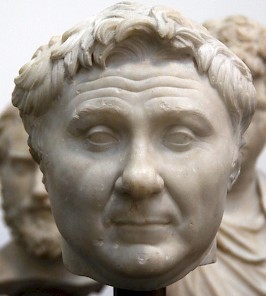
The Senate demanded Caesar's First and Fifteenth Legions to be sent to the east. Caesar obeyed, but discovered that the legions were never employed in Syria. Instead, they remained in Italy. He must have understood that he was regarded with suspicion. He started to train his army in the valley of the Moselle, far away from the Senate's spies. One of the camps has been identified at Hermeskeil.
After Crassus' death, only Pompey and Caesar remained, and the Senate feared a civil war from which a king would arise. (The tense atmosphere of distrust is described here.) An overwhelming majority in the Senate (400 against 22) wished both dynasts to lay down their extraordinary commands before the consular elections in December 50. (The question whether this was lawful remains unanswered: in 52, the People's Assembly had allowed Caesar to run for consul without being present.) After some deliberations, Pompey obeyed the Senate.
He was in a better position than Caesar. If the latter obeyed, he was no longer immune to prosecution. Cato had charged him with war crimes in Germania, and many people remembered Caesar's first consulship and the Spanish War. If Caesar refused to obey, he would be declared an enemy of the state; the Senate would be forced to appoint a commander with extraordinary powers. And it was not hard to see who this general would be: Pompey.

In 49 BCE, on the seventh of January, the Senate demanded Caesar to hand over his ten well-trained legions to a new governor. Caesar heard the news in Ravenna, and knew that he had to make a choice between prosecution and rebellion; preferring the dignity of war over the humiliation of a process, Caesar chose to rebel, quoting his favorite poet Menander, "the die is cast" (alea iacta est). In the night of 10/11 January, the Thirteenth legion advanced to Rimini, where he could control the passes across the Apennines. In doing so, he crossed the river Rubicon, thereby invading Italy and provoking the Second Civil War. Caesar's perspectives did not look great: nine of his legions were still on duty in Gaul (text). It is probably at this early stage of the war, that constituted the Sixteenth legion.
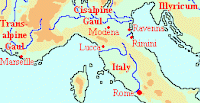
However, it turned out that the Senate had made a disastrous mistake. It had believed that the issue was between a rebel and the legitimate rulers, and it had expected that the towns of Italy would send troops in defense of the authority of the Senate and the Roman People's liberties. But Italy was skeptical about its champions, and showed little enthusiasm to defend the senatorial constitution. For Caesar's soldiers, on the other hand, everything depended on this one campaign: if they failed, they would never receive their pension. Remaining doubts must have disappeared when Caesar doubled the wages of the legionaries.
Unable to raise armies, the Senate was helpless. Moreover, the legions that were present in Italy, were unreliable: for example, the fifteenth had been with Caesar in Gaul. The invader soon received reinforcements (the legions V, VIII, XII, XVI), and two months after the start of the Civil War, Caesar was master of Italy and had hunted down his enemies to the heel of Italy, from where Pompey and the majority of the senators fled eastward, to Greece (17 March).
Caesar did not waste his time. To him, the situation was clear: the Senate had seven legions in Hispania without commander, and Pompey was in Greece without army. Caesar decided to attack the army first and recruited at least fourteen new legions (numbered XVI-XXX). The Fifteenth, which seems to have sided with Caesar, and the new Sixteenth were ordered to occupy Africa, but were annihilated.
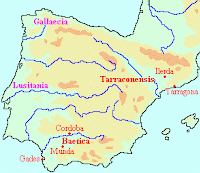
When he entered Rome, a city where he had not been for ten years, Caesar pardoned instead of massacred his enemies and created a new Senate, which would authorize Caesar's acts (April 49). Before it had assembled for the first time, Caesar was already on his way to Hispania, in the meanwhile proposing a law granting Roman citizenship to the inhabitants of Cisalpine Gaul. After picking up several legions in the neighborhood of Marseilles, Caesar crossed the Rhône and the Pyrenees with the legions VI, VII, VIIII, X, XI, XIV, XXVIII, XXIX and XXX, and defeated the Spanish army in the Battle of Ilerda, not far from modern Barcelona (2 August). Again, Caesar showed clemency, sparing the enemy commanders and disbanding the defeated legions. He rushed to Córdoba in Andalusia, where two legions (commanded by Marcus Terentius Varro) surrendered to Caesar (September). After his return, Caesar was made dictator. He had been out of Rome for six months.
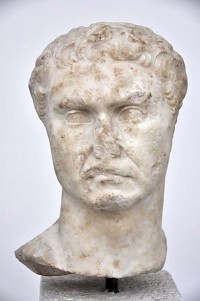
Meanwhile, Pompey was in Greece, and by drawing upon the resources of the eastern provinces and some client kings, he managed to raise an army of nine legions and a fleet of 300 ships, commanded by Bibulus (see above). Two additional legions were still on their way to Greece but would arrive soon. Now, Pompey was ready to return to Italy to attack Caesar. This was precisely what Caesar feared, and he tried to sent his veterans across the Adriatic: the legions V, VI, VII, VIII, IX, X, XI, XII, XIII, XIV, XXVII and another legion were gathered at Brundisium (modern Brindisi).
Despite the great risks of winter navigation, seven legions were carried to modern Albania in January 48 BCE, but Caesar's navy was defeated and the remaining four legions could not be ferried to the east. For a half year, Pompey and Caesar remained at Dyrrhachium (modern Dürres), where they built large fortresses facing each other. In March, Caesar's colonel Mark Antony (82-30 BCE) managed to reinforce him with the other four legions. (Italy was now defended by seven newly recruited legions: I, II, III, IIII, XXXI, XXXII and XXXIII.)
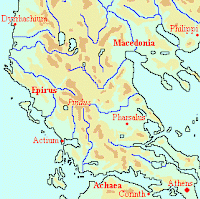
The united army, however, was defeated (7 July), and Caesar had only one option: to march inland, cross the Pindus mountains and defeat Pompey's pursuing army somewhere in Greece on a more suitable place. This eventually happened in the battle of Pharsalus, where Caesar's more experienced men overcame Pompey's larger army (9 August; text; another text). Almost 6,000 Roman soldiers were killed, and when Caesar surveyed the battlefield at sunset and saw the bodies of the dead senators, he remarked: "Well, they would have it thus."
Pompey's soldiers were enlisted in four new Caesarian legions (XXXIV-XXXVII). They were sent to the east, where they had to defend Syria. Caesar's own legions were sent back to Italy (except for the Sixth): some of their soldiers had been in his service for twelve years, and they were looking forward to their pension.
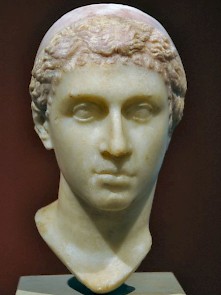
Pompey survived the Battle of Pharsalus, and went to Egypt, followed by Caesar and the legions VI and XXVII. When they arrived, they learned that Pompey had been murdered by soldiers of the ten-year-old king Ptolemy XIII, who hoped to gain Caesar's support in his quarrel with his older sister Cleopatra VII. It turned out differently, because Caesar was in fact furious that he was not given the chance to pardon his eternal rival Pompey. At least, that is what Caesar said. He must in fact have known that Pompey the Great would not have accepted a pardon.
When Caesar met Cleopatra in Alexandria, he was captivated by the young woman's charms and chose her side in the Alexandrine War: in the spring of 47 BCE, he defeated Ptolemy. The boy's body was found in the Nile (27 March) (text).

Having pacified Egypt, Caesar and Cleopatra could spend some time together - at least enough for Cleopatra to claim to have become pregnant of a son, Caesarion - but then Caesar hurried off to Asia Minor, where Pharnaces II, the son of Mithridates of Pontus, had challenged Roman authority, and allied himself to the tribe of the Sarmatians. Pharnaces was defeated in a rapid campaign at Zela ("I came, I saw, I conquered", veni, vidi, vici).
Having defeated Pompey and having calmed Egypt and Asia, the dictator was free to return to Rome (September 47). He was unaware of the fact that his opponents, the last republican diehards, had been able to regroup in Africa while he was honeymooning in Egypt.